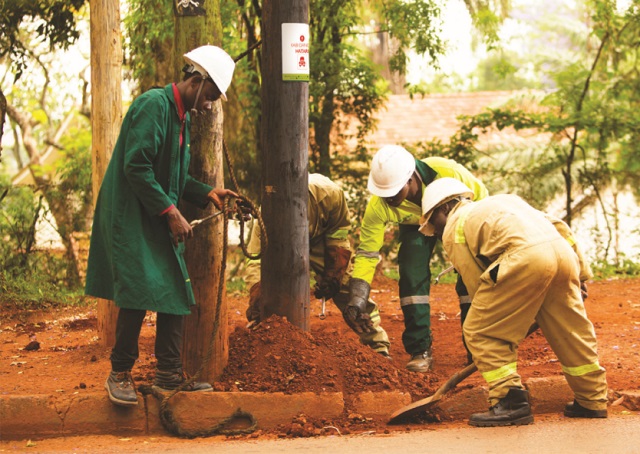
Kampala, Uganda | THE INDEPENDENT | Finance Minister Matia Kasaija says the government is to extend power distributor Umeme’s concession.
His revelation ends the uncertainty over Umeme’s future in Uganda’s energy sector as electricity supplier.
Kasaija in his 2019/20 financial year budget speech however said the concession with Umeme Limited will be renegotiated and extended to ensure further investment, and also lower electricity tariffs.
Umeme’s contract is expiring in 2025, but there has been speculation the company might not get its concession renewed.
The speculation was heightened by a letter last year by President Museveni where he accused the company of deliberating maintaining technical losses high (17%), which was costly to the taxpayers, despite the company claiming to have invested more than $500m in the industry.
The president them ordered that it was high time the country looked for Umeme’s replacement.
The change in tone shows Umeme has been able to convince the government that it was the best candidate for the job.
Kasaija announced that the total installed electricity generation capacity is now 1,200MW, with the completion of several hydropower generation projects including Isimba Hydropower Dam.
High Voltage Electricity transmission grid infrastructure now totals 2,258km. Later this year, the 600MW Karuma is expected to be launched and this will be installed electricity generation capacity to nearly 2,000MW.
The task to Uganda Electricity Transmission Company Limited, which buys power in bulk, and Umeme is to make sure this power reaches the bulk users.
Umeme leaders have said they needed up $1bn to build a network to distribute the extra power being produced.
Kasaija was silent on the issue of heavy fuel thermal power connected to the grid. Many have wondered why the government still buys thermal power from Electro-Maxx and Jacobsen amidst reported excess hydro-electric power.
Electro-Maxx and Jacobsen is still contributing up 100MW to the national grid. The two companies’ agreements with the government are secret but there is a wider assumption that their role was supposed to end the moment the government starts producing enough electricity.
Their stay means fuel or the price of oil will continue to be a key feature in the country’s electricity tariff.
In January, the ministry of finance asked for a supplementary budget that included Shs 106bn to clear payments for the two companies.
Africa Institute for Energy Governance (AFIEGO), has repeatedly called on government should consider canceling the Power Purchase Agreements (PPAs) it signed with Jacobsen and Electro-Maxx.
The energy sector activist group argues that there is no need why tax payers should continue to pay for more expensive thermal power at the time when Uganda is producing enough hydro power which is more environmentally friendly.
Kasaija said government plans to cut the electricity of power to five US cents from the 7 US cents KW per hour for the big industries. Domestic consumers and smaller industries continue to pay higher tariff – at 11US cents – for now.
Kasaija said government the Electricity Connection Policy will continue to subsidize them cost of electricity connections.
“Over 300,000 connections are targeted annually,” he said. “This initiative will realize growth in access to electricity to 30% by the end of 2020, and 60% by 2026. Furthermore, the use of renewable energy such as a solar system for lighting rural homes and for the national grid is being implemented.”
Currently, 22% of Ugandans have access to electricity – both on the grid and off the grid.
******
URN
 The Independent Uganda: You get the Truth we Pay the Price
The Independent Uganda: You get the Truth we Pay the Price





